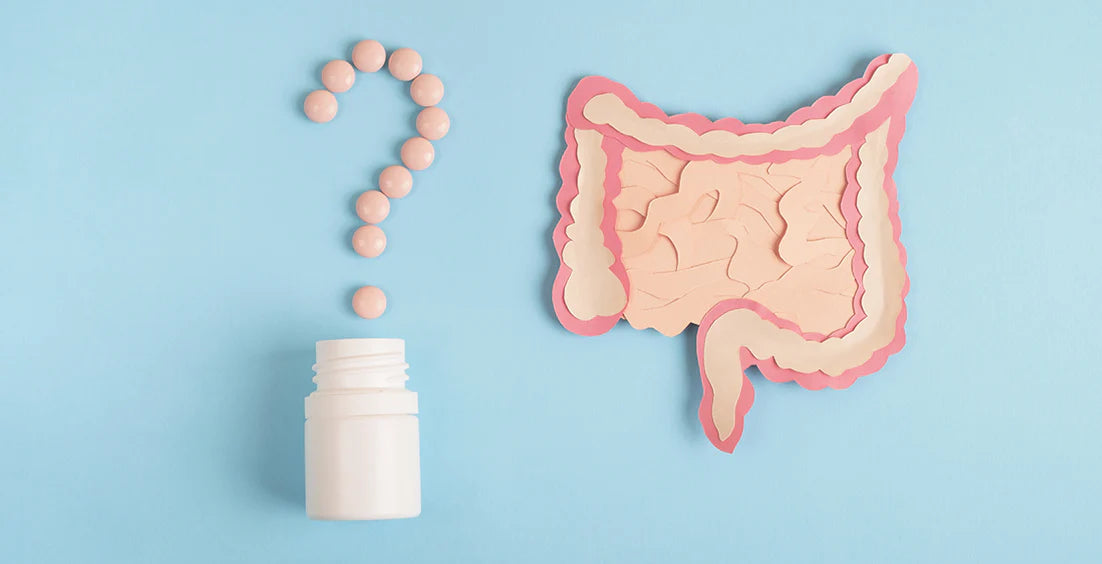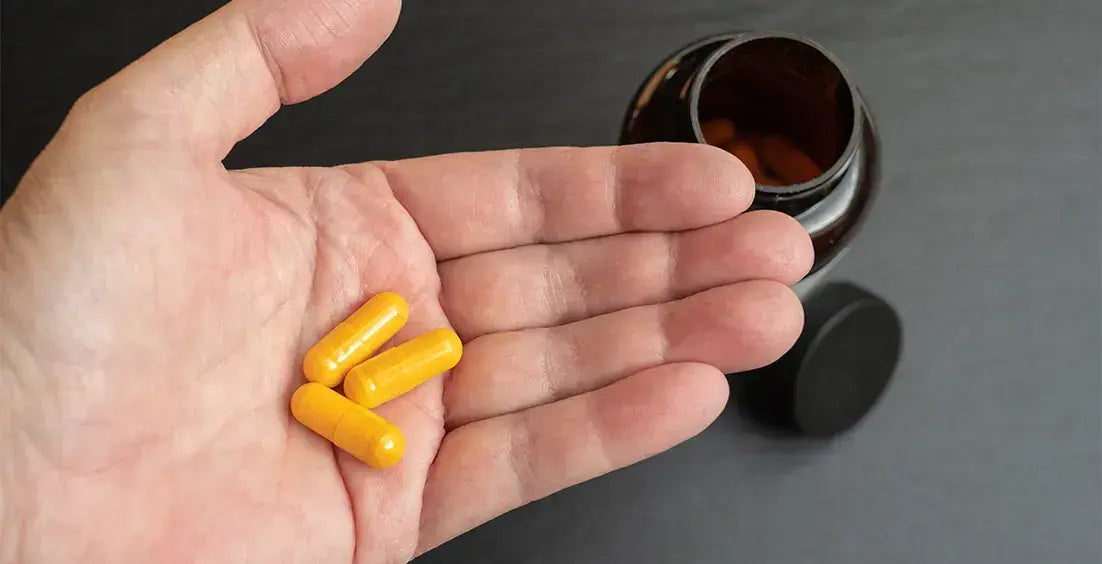Inulin vs Psyllium: Which Is Better for Gut Health?
Discover which is the better option for gut health between inulin or psyllium. This article provides a detailed comparison of these two types of fiber.

Gut health plays a vital role in your overall health and wellbeing. There have even been links established between your digestive system and cognitive faculties as well as your immune system.
Simply put: when your digestive health is out of whack, your whole body is likely to suffer for it. This is why fiber can be so important for your general health. Dietary fiber is a key nutrient for digestive function which touches on many other aspects of your health.
The importance of fiber has led many health-conscious consumers to wonder about psyllium husk vs inulin fiber as they pertain to digestive health. More specifically: which is better for gut health, psyllium or inulin?
So in the following article, we will explore the debate of inulin fiber vs psyllium to help you decide which is the best route to take for your digestive health.
Key Takeaways
- Psyllium husk is a substance that is rich in soluble fiber which makes it helpful for managing symptoms like constipation
- Inulin is also a fiber-rich food that has been used to improve digestive function
- Fiber is important for gut health because it can expedite waste processing by producing healthy gut bacteria and protect digestive lining
- In the end, some consumers may find that psyllium and inulin are both helpful for improving digestive function
What is Fiber and Why is it Important for Gut Health?
To put it in cursory terms: fiber is essential for gut health because it allows for the functional processing of foods, nutrients, and waste material. But there are three specific ways in which fiber is beneficial for gut health:
- It Maintains the Digestive Lining - Dietary fiber contributes to the integrity of your digestive tract’s lining. The lining of your gut can cover about 4,000 square feet according to Harvard Health. So it’s very important to keep this lining intact.
- It Produces Short-Chain Fatty Acids - Short-chain fatty acids can be developed in the digestive system. Short-chain fatty acids are very important to overall health because they influence the immune system and can suppress inflammation. In turn, short-chain fatty acids depend on fiber in the gut. Fiber is processed by beneficial gut bacteria and the end results are short-chain fatty acids.
- It Proliferates Good Gut Bacteria - There are certain bacteria in the gut that help your digestive system function normally. But this bacteria needs to be fed in order to function and regenerate. Dietary fiber is sort of like the favorite food of healthy gut bacteria. So by consuming fiber, you are making sure that the good gut bacteria survive and thrive.
It’s important to understand that inulin and psyllium both contain a good amount of dietary fiber. That’s why taking psyllium and inulin together is a common practice among people with severe digestive problems like IBS (Irritable Bowel Syndrome) and acid reflux.
But which dietary fiber is better if you have to choose just one? To answer that question, we should first take a look at each type individually.
Understanding Inulin
Inulin is a type of dietary soluble fiber. It is found in many types of natural foods such as garlic, onions, asparagus, jicama, bananas, artichoke, leeks, wild yams, wheat, soybeans, burdock, and chicory root.
In fact, according to the Pubmed staff, inulin is found in more than 36,000 plant species around the world. As a dietary soluble fiber, inulin has a beneficial effect on gut bacteria. Namely, it helps gut bacteria produce fatty acids that benefit the entire body. Here are some more benefits:
- Weight Loss - Inulin may increase feelings of satiety which can help you lose weight.
- Lower Blood Sugar - Inulin fiber may be effective for inhibiting the absorption of glucose. This can help lower blood glucose levels.
- Gut Health - Inulin fiber can also feed good gut bacteria so it has a prebiotic effect on the digestive system.
Understanding Psyllium Husk
Psyllium husk is another kind of soluble fiber that occurs naturally in the plant genus known as Plantago. Psyllium husk is widely used as a commercial laxative in extract form because it absorbs water in the digestive tract and softens the stool.
Products containing psyllium husk are often used to alleviate both constipation and diarrhea as it too has a beneficial effect on gut bacteria. Let’s take a look at a few benefits of psyllium:
Inulin vs. Psyllium: A Comparison
As you can probably tell if you’ve read this far, there are a lot of similarities between inulin and psyllium. But in the following section, we are going to compare the merits of these kinds of fibers as they pertain to specific health concerns:
Irritable Bowel Syndrome
In general, psyllium husk is considered a better choice for people who are suffering from IBS. That’s because inulin has been known to cause digestive gases that can sometimes worsen the painful or uncomfortable symptoms of IBS.
On the other hand, psyllium husk can soften the stool and improve digestive function without generating excess gas that can irritate conditions of IBS.
Constipation
In terms of inulin vs psyllium for constipation, again, psyllium is typically more beneficial for the specific condition of constipation because it absorbs moisture and imparts it to the stool. This softens the stool and makes it easier for it to pass through the colon, effectively alleviating conditions of constipation.
Weight Loss
Inulin and psyllium fiber are both beneficial for weight loss but in different ways. For example, inulin fiber is usually attributed to increased feelings of satiety after a meal because it appears to reduce the hormones that typically signal the brain to eat.
On the other hand, psyllium can affect weight loss by acting as a laxative so that the body doesn’t hold on to so much waste matter.
Diarrhea
Inulin Vs Psyllium for Diarrhea - When talking about inulin vs psyllium for diarrhea, once again, psyllium is probably the better choice. That’s because psyllium is essentially a bulking agent. It combines with water to form softer, more solid stools that can pass easier through the colon. So it can help transform the loose stool attributed to diarrhea into more solid, healthy stools.
Conclusion
So which type of fiber is better for gut health: psyllium or inulin? Well, if you’ve made it this far into the article, you can probably tell that both inulin and psyllium have their time and place in overall human health.
Inulin is necessary for developing healthy compounds that benefit your digestive functions, your immune system, and even your blood sugar levels. Then there’s psyllium husk which can improve stool quality and help alleviate constipation.
Psyllium husk fiber can also be beneficial for reducing the severity and frequency of diarrhea because it acts as a bulking agent for fecal matter. Psyllium may also help people manage the symptoms of IBS.
In the end, you may choose to take a psyllium husk and inulin supplement together for their varied health benefits. Still, the best way to find out exactly which supplements you should be taking is to consult with your healthcare practitioner.
It’s also always advisable to compare the ingredients in any kind of dietary fiber supplement you are considering taking. That’s because some of these kinds of supplements contain unnecessary fillers or harmful ingredients.
But whether you choose to take psyllium, inulin, or both types of fiber, you should always pair them with a healthy lifestyle. This means eating plenty of fruits and vegetables, getting regular exercise, and staying abstaining from excessive alcohol intake.
About WOWMD Staff
The WOWMD Staff category features a diverse team of writers, each bringing specialized knowledge in areas such as nutrition, fitness, wellness, and more. Articles in this category benefit from insights provided by multiple experts. All content is peer-reviewed and regularly updated to ensure compliance with our editorial standards.
References
- Leaky gut: What is it, and what does it mean for you?: https://www.health.harvard.edu/blog/leaky-gut-what-is-it-and-what-does-it-mean-for-you-2017092212451
- Inulin: properties and health benefits: https://pubmed.ncbi.nlm.nih.gov/36876591/
- Inflammation in Irritable Bowel Syndrome (IBS): Role of Psyllium Fiber Supplementation in Decreasing Inflammation and Physiological Management of IBS: https://pmc.ncbi.nlm.nih.gov/articles/PMC8975494/
- RANDOMIZED CLINICAL TRIAL: SOLUBLE/INSOLUBLE FIBER OR PSYLLIUM FOR CHRONIC CONSTIPATION: https://pmc.ncbi.nlm.nih.gov/articles/PMC4891216/
Evidence Based Research
This WOWMD content has been reviewed, as well as checked for facts, so as to guarantee the best possible accuracy.
We follow a strict editorial policy, especially related to the sources we use. Our articles are resourced from reputable online pages, with research drawn from academic institutions and peer-reviewed studies. You can click on the numbers in the parentheses (1, 2, etc.) and check out those references.
The feedback form on this page can be used to report content that is not accurate, up-to-date or questionable in any manner.
We do NOT intend for the information presented through our articles to replace the medical relationship with a qualified physician, nor does it represent specialized advice.


 Skin Detoxification Bundle
Skin Detoxification Bundle Complete Weight Loss Bundle
Complete Weight Loss Bundle Heart Care Bundle
Heart Care Bundle Better Immunity Bundle
Better Immunity Bundle  Men's Immunity & Prostate Health Bundle
Men's Immunity & Prostate Health Bundle Stress + Energy + Wellness Combo
Stress + Energy + Wellness Combo  Energy Booster Combo
Energy Booster Combo Natural Skin Care Bundle
Natural Skin Care Bundle Workout Supplements Combo
Workout Supplements Combo Cognitive Health & Vision Combo
Cognitive Health & Vision Combo Joint Health Support Combo
Joint Health Support Combo

















 By WOWMD Staff
By WOWMD Staff